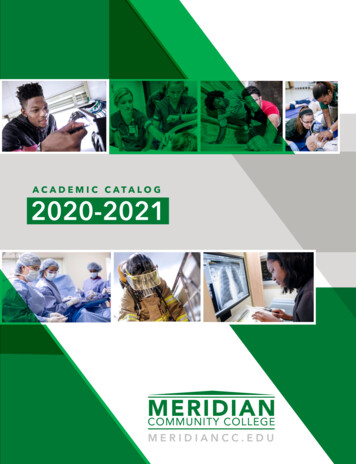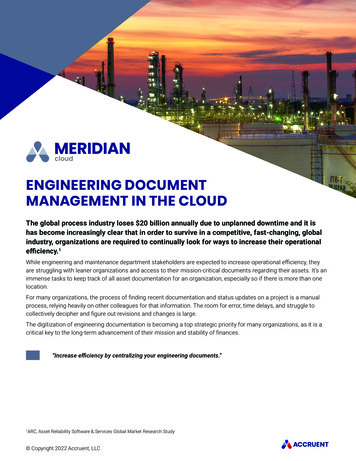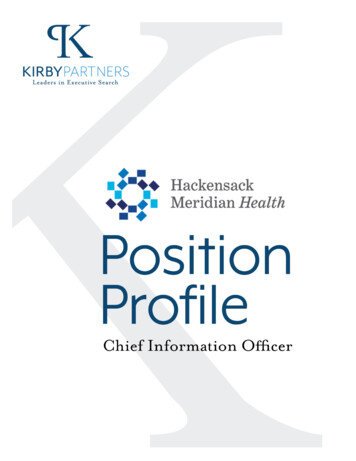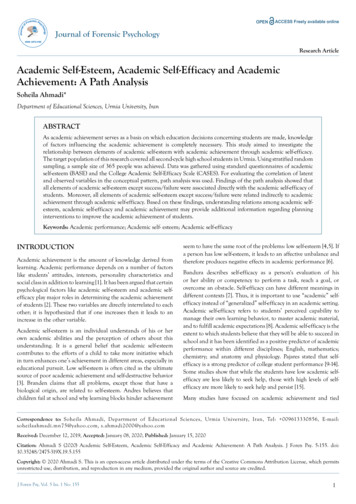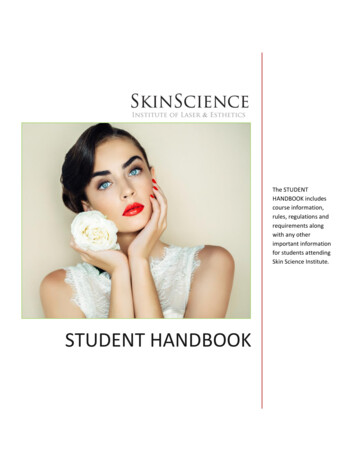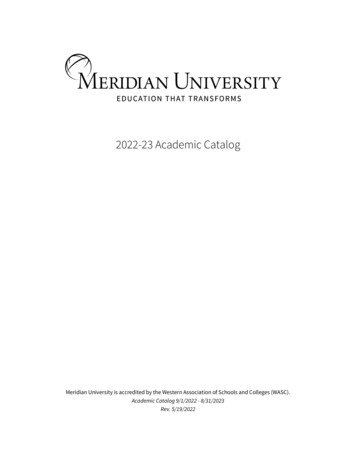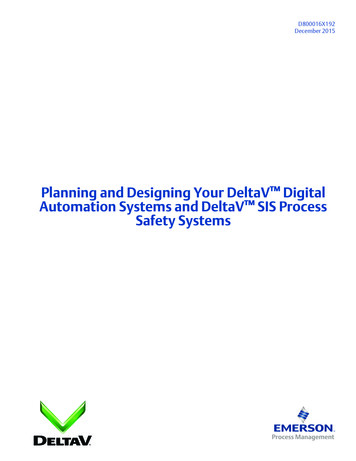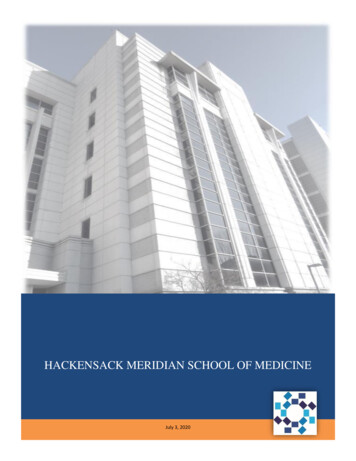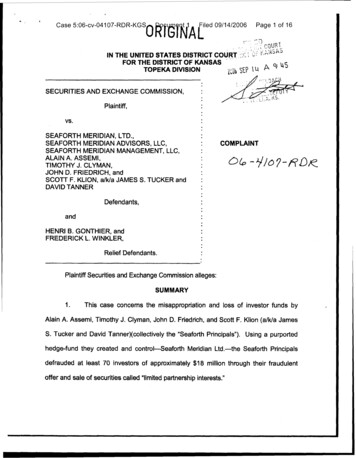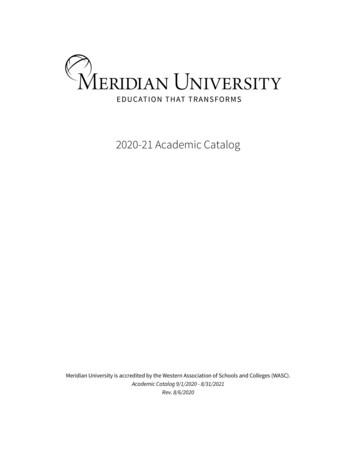
Transcription
2020-21 Academic CatalogMeridian University is accredited by the Western Association of Schools and Colleges (WASC).Academic Catalog 9/1/2020 - 8/31/2021Rev. 8/6/2020
2020-21 Academic CatalogTable of ContentsABOUT MERIDIAN UNIVERSITY4TRANSFORMATIVE LEARNING4LEARNING FORMAT5ACADEMIC PROGRAMS OVERVIEW7MBA IN CREATIVE ENTERPRISE8CONCENTRATIONS10BUSINESS COURSE DESCRIPTIONS10MEd IN EDUCATIONAL LEADERSHIP24EdD IN ORGANIZATIONAL LEADERSHIP26CONCENTRATIONS27EDUCATION COURSE DESCRIPTIONS27PSYCHOLOGY PROGRAM OVERVIEW41PSYCHOLOGY FIELDWORK REQUIREMENT44MA IN PSYCHOLOGY45MA IN COUNSELING PSYCHOLOGY46PREPARATION FOR CALIFORNIA MARRIAGE & FAMILY THERAPY LICENSURE46PREPARATION FOR CALIFORNIA PROFESSIONAL CLINICAL COUNSELOR LICENSURE48PsyD IN CLINICAL PSYCHOLOGYPREPARATION FOR PSYCHOLOGIST LICENSUREPhD IN PSYCHOLOGYPREPARATION FOR PSYCHOLOGIST LICENSURE49495152CONCENTRATIONS53PSYCHOLOGY COURSE DESCRIPTIONS54CERTIFICATES83CORE AND ADJUNCT FACULTY83LOCATIONS90BAY AREA CENTER901
2020-21 Academic CatalogOAKLAND CENTER90ADMINISTRATION & TRUSTEES90ACADEMIC AND ADMINISTRATIVE INFORMATION91LEARNING RESOURCES91ACCESS TO COMPUTER RESOURCES92PRACTICE GROUPS93RESEARCH ETHICS AND INSTITUTIONAL REVIEW BOARD93ACADEMIC FREEDOM POLICY94NON-DISCRIMINATION POLICY94CAMPUS SECURITY POLICY95VACCINATION POLICY96DISABILITY ACCOMMODATION POLICY96STUDENT RECORDS AND RETENTION OF STUDENT RECORDS POLICY96CREDIT HOUR POLICY97EVALUATION OF STUDENTS POLICY97SATISFACTORY ACADEMIC PROGRESS POLICY98MAXIMUM TIMEFRAME104ADVANCEMENT TO CANDIDACY POLICY106ATTENDANCE POLICY106LEAVE OF ABSENCE POLICY108WITHDRAWAL111INTEGRITY POLICY113PEER-TO-PEER FILE SHARING, INTELLECTUAL PROPERTY AND COPYRIGHT POLICIES113COPYRIGHT INFRINGEMENT113PEER-TO-PEER FILE SHARING115INTELLECTUAL PROPERTY POLICY116DRUG AND ALCOHOL POLICY117MULTIPLE ROLES POLICY122SEXUAL HARASSMENT POLICY123HARASSMENT, INTIMIDATION, BULLYING, AND DISCRIMINATION POLICY1252
2020-21 Academic CatalogACADEMIC PROBATION POLICY127ADMINISTRATIVE WITHDRAWAL POLICY128CONFLICT RESOLUTION PROCESS AND GRIEVANCE PROCEDURE128FINANCIAL INFORMATIONPAYMENTSPAYMENT PLANS AND DUE DATES129130130CREDIT BALANCES132MORE INFORMATION132FINANCIAL AID132Veterans Administration Educational Benefits135STUDENT CONSUMER INFORMATION DISCLOSURES136SATISFACTORY ACADEMIC PROGRESS138NON-DISCRIMINATION POLICY138COST OF ATTENDANCE139INTERNATIONAL STUDENTS141PRIVATE ALTERNATIVE EDUCATION LOANS143GLOSSARY OF FINANCIAL AID TERMS145NON-DISCRIMINATION POLICY146STUDENT’S RIGHT TO CANCEL146REFUNDS147ADDITIONAL REFUND INFORMATION149RETURN OF FEDERAL FUNDS POLICY (R2T4)1502020-21 SCHEDULE OF CHARGES155COST OF ATTENDANCE161NOTE REGARDING LOANS163ADMISSIONS INFORMATION163APPLYING TO MERIDIAN165TRANSFER CREDIT166INTERNATIONAL STUDENTS167MORE INFORMATION AND RESOURCES1683
2020-21 Academic CatalogACCREDITATION AND APPROVALNOTICE OF DISCLAIMER169172ABOUT MERIDIAN UNIVERSITYMeridian University is dedicated to enabling human development through wise transformative impactacross multiple domains with global reach and local value. Meridian’s graduate degree programs inBusiness, Psychology, and Education enable students to combine passion with profession in serviceof larger social, cultural, ecological, and developmental goals.Each of Meridian’s degrees provides students with an integrated set of skills and capacities that aregrounded in the principles and practices of Transformative Learning along with next-practices specificto the degree and concentration chosen by each student. Meridian’s unique learning model enablesstudents to combine onsite residencies, asynchronous online learning, and engaging video calls todevelop an educational path that fits both their life and vision via Meridian’s own integratedtechnology platform.Meridian is accredited by the WASC Senior College and University Commission and approved by theUS Department of Education for participation in the Federal Student Aid program. WASC is theDepartment of Education-recognized regional accreditor for such schools as the University ofCalifornia at Berkeley, UCLA, and Stanford University. Meridian’s licensable degrees have beenrecognized by the California Board of Behavioral Sciences and Board of Psychology for over 25 years.TRANSFORMATIVE LEARNINGEngaging Transformative Learning entails shifts in perspectives, core beliefs, habits, assumptions,schemas, mental models, and mindsets. A major purpose of Transformative Learning is for thestudent to become more capable of engaging complex challenges and collaborations, as well as moreaccelerated and integrated Informational Learning. Transformative Learning transforms how thelearner perceives the world, how the learner inhabits and functions in the world, and how the learnerengages the world, to transform it.Transformative Learning is learning that goes beyond acquiring information and skills, towardsdeveloping individual and system capabilities. This is a shift from having information and skills tobeing capable. Such learning entails a shift in perceptual lenses, enabling individuals and systems toinhabit new and more complex emergent landscapes.4
2020-21 Academic CatalogTRANSFORMATIVE LEARNING COMMUNITYA transformative learning community catalyzes experiences which are transformative and integrative.Transformative learning supports the inherently active and social nature of knowledge. Learning howto learn is at the heart of this approach.When transformative learning is practiced in a supportive community, we are able to inhabitvulnerability and mystery. Through the recognition of each other’s unique potentials and limitations,a collective process of creative inquiry unfolds. This approach builds relationships with reciprocityand mutuality; it is especially suited to the transformative dimensions of adult learning.TRANSFORMATIVE LEARNING IN HIGHER EDUCATIONWithin higher education, both students and faculty are under intense pressure to acquire andtransmit ever-increasing information. These circumstances result in a focus on competenciesassociated with informational learning. However, the performance deficiencies of higher educationgraduates as professionals suggests that something vital is missing. The future calls for integratedcompetencies that enable professionals to acquire and manage vast domains of informationeffectively enough to participate in wise and creative initiatives. Transformative Learning preparesgraduates for this challenge.At Meridian, care and attention have been given to the how of teaching and learning, as well as onwhat information should be transmitted. It is clear that in order for transformative learning toflourish, a well-sealed and supportive container is required. Toward this intent, Meridian has chosenparticular formats and practices in constructing its learning environment.LEARNING FORMATAll of Meridian's degree programs are offered in a hybrid format. Each quarter, students take one ormultiple seven-week online courses. This adds up to 28 weeks a year -- just about half the year thatcourses are actively running. This gives students a break between quarters to rest and prepare. Inaddition, students are expected to attend two week-long residencies per year. Residencies runMonday through Friday, with collaborative engagement facilitated each evening.ONLINE COURSEWORKOnline coursework is primarily conducted asynchronously, providing students the opportunity toparticipate in collaborative learning with faculty and fellow students during times that are convenientfor personal schedules. Faculty do encourage their online classes to meet synchronously (virtually,5
2020-21 Academic Catalogbut in real-time), so as to have real-time contact outside of residencies; however, while real-timeattendance is encouraged, it is not required. At times students are asked to meet in virtual smallgroups at mutually convenient times. Meridian faculty and staff collaborate to provide an onlinelearning experience for students that invites new and unexpected meanings to emerge.FACULTY RESPONSE TIMEFaculty respond to students’ work (weekly lessons, projects, or doctoral project submittals) withintwo to 30 working days, depending on the nature of the assignment.CLASSROOMS AND MEETING SPACEAll classrooms and meeting spaces are equipped with either built in or mobile AV equipment whichincludes a computer, projector, multimedia players, projection screens, whiteboards, table, chairs,and markers. Table and chairs are also provided for all instructional spaces. Students are expected tonotify staff of any equipment needs.COURSEWORK FORMAT AVAILABILITYResidency location and schedule may vary by course and quarter.6
2020-21 Academic CatalogACADEMIC PROGRAMS OVERVIEWMeridian University offers graduate degree programs that educate students to engage the professionsof Psychology, Business, and Leadership in creative and transformative ways. These degree programsprovide a cumulative, emergent, and integrated curriculum, empowering the student’stransformation both personally and professionally.DEGREE PROGRAMSBUSINESS MBA in Creative EnterpriseEDUCATION MEd in Educational Leadership EdD in Organizational LeadershipPSYCHOLOGY MA in Psychology MA in Counseling Psychology PsyD in Clinical Psychology PhD in PsychologyACADEMIC YEARDepending on the program and program year, approximately 300-370 classroom hours(approximately 30-37 quarter credits) are completed each academic year. The academic year beginsSeptember 1st and ends August 31st.INSTITUTIONAL LEARNING OUTCOMESEach degree program at Meridian University entails learning objectives that implement the followingInstitutional Learning Outcomes:1. LEADERSHIP CAPACITIESStudents will cultivate leadership capacities aligned with the specific profession that is the focus ofthe degree program.2. CREATIVE INQUIRY SKILLSStudents will develop creative inquiry skills aligned with the specific profession that is the focus of thedegree program.7
2020-21 Academic Catalog3. PROFESSIONAL KNOWLEDGEStudents will acquire professional knowledge specific to the focus of the degree program.MBA IN CREATIVE ENTERPRISEMBA IN CREATIVE ENTERPRISE DEGREE OVERVIEWThe MBA in Creative Enterprise is located at the intersection of three primary emphases: Transformative InnovationGenerative Entrepreneurship and Cultural LeadershipApplied Wisdom and Sustainability: Regenerating the CommonsEDUCATIONAL OBJECTIVES FOR THE MBA IN CREATIVE ENTERPRISE1. Cultivating Leadership Capacities: To cultivate the leadership capacities that furthertransformative and ethical engagement within business and cultural contexts.2. Practicing Creative Action Inquiry: To develop creative inquiry skills that enable collaborationresponsive to high complexity and ambiguity.3. Core Business Functions: To identify and implement business methods and practices of humanresources, operations, economics, finance, accounting, marketing, management, andstrategy, towards building and sustaining a creative enterprise.4. Generative Entrepreneurship and Transformative Innovation: To develop the practices andperspectives that link entrepreneurial competencies with impacting the commons in waysthat are generative and emancipatory, and to ignite individual and collective creativity togenerate emancipatory, disruptive, and transformative innovations.5. Transforming Business as a Profession and Regenerating the Commons: To developcompetencies required to conceive, build, and lead creative and emancipatory enterprises; toapply the competencies associated with generative entrepreneurship to producing generativeglobalization in service of thriving local communities, restoration of the earth’s resources, andregenerating the commons.MBA IN CREATIVE ENTERPRISE PROGRAM LEARNING OUTCOMES1. Reflexivity: Skillful and embodied self-awareness8
2020-21 Academic Catalog2. Empathy: Depthful understanding of the other’s needs and circumstances on multiple levels,states, and life circumstances.3. Collaborativity: The capacity to associate with others in ways that foster individuality,autonomy, complexity, dependability, and reciprocity.4. Collaboration Skills: Skills that enable creative responses to challenges entailing highcomplexity, uncertainty, and ambiguity in organizational and business contexts.5. Culture: Knowledge of stories and values that constitute how culture shapes individual andcollective experience within business, from the micro (individual business) to the macro(global business cultures), and the role of cultural innovation in cultural leadership andtransformative innovation.6. Social Justice and Diversity: Identify the consequences and antecedents of injustice andoppression in cultural, business, and human resource contexts, informed by transdisciplinaryperspectives.7. Core Business Functions: Identifying and implementing business methods and practices ofhuman resources, operations, economics, finance, accounting, marketing, management, andstrategy towards building and sustaining a creative enterprise.8. Producing Transformative Innovation: Competencies for individual creativity and forigniting the dynamics of collective creativity to generate emancipatory, disruptive, andtransformative innovations designed to impact both the whole person and whole-system.9. Generative Entrepreneurship: Practices and perspectives that link entrepreneurialcompetencies with impacting the commons, in ways that are generative and emancipatory.10. Regenerating the Commons: Applying the competencies associated with generativeentrepreneurship to producing generative globalization, in service of thriving localcommunities, global justice, and restoration of the earth’s resources.11. Transforming Business as a Profession: Competencies to conceive, build, and lead creativeand emancipatory enterprises that serve to regenerate the commons, enhancingsustainability and social justice.9
2020-21 Academic CatalogGRADUATION REQUIREMENTS FOR THE MBA IN CREATIVE ENTERPRISE Students are required to complete 64 credits (640 hours).Students are required to attend 3 residencies.Students are expected to engage in a ‘Creative Action Practicum’ with a business ororganization, over a period of two quarters.Students are expected to complete a Creative Action Project (capstone).Students have a maximum of five years from the initial date of enrollment to complete thisdegree.CONCENTRATIONSStudents in Meridian’s Business program can elect a concentration. Please see Meridian's website forfurther information.BUSINESS COURSE DESCRIPTIONSANC 101INTRODUCTION TO TRANSFORMATIVE LEARNINGThe necessity and importance of Transformative Learning grows in times of crisis and complexity. Welive in such a time, and as such Transformative Learning is being practiced within multiple domains,multiple levels, and utilizing varied approaches.This course introduces students to Imaginal Process, a distinct approach to transformative learningpracticed at Meridian. In this approach, human capacities are cultivated through diversifying,deepening, embodying, and personalizing experience. Imagination amplifies and integrates thesensory, emotional, and cognitive dimensions of our experience. Through the labor of imagination, itis possible to craft our experience towards truth, joy, and effectiveness. This approach reflects anemerging multidisciplinary and multicultural synthesis which can be applied to education, therapy,organizations, and the arts.Listening deeply to each other’s stories is at the heart of this process. The living presence thatconstitutes good listening requires that we inhabit vulnerability, mystery, and complexity. Thisgathered listening engages the empathic imagination in ways that catalyze mutual individuation. (4credits)ANC 103ART AND SCIENCE OF WELL-BEINGHuman well-being is multi-dimensional: Biological, biographical, cultural, social, historical,evolutionary, spiritual, aesthetic, ecological, and economic. A wide and deep inquiry into thepossibilities and actualization of human well-being entails an integral approach that meaningfullyand trans-contextually draws together these many dimensions.10
2020-21 Academic CatalogThis course reviews knowledge from scientific research and professional practice concerning centralfunctions of human existence, such as relating, learning, working, and ritualizing. The primary aim isto develop both personal and professional capabilities for coherent and creative action in respondingto individual and collective complex challenges. (4 credits)ANC 105EMOTIONAL DEVELOPMENTEmotions are an essential dimension of both individual and collective human development. Inaddition, emotions have a critical role in human well-being. Emotional development also significantlyimpacts our development physically, cognitively and spiritually. Research in neuroscience over thelast thirty years has contributed significantly to our current understanding of emotions. This researchhas now been extensively applied to the functioning of families, schools and workplaces.Topics explored in this course in relation to emotion include: Attachment, empathy, conflictimagination, gender, sexuality, leadership, self-regulation, power, and destructive emotions such ashate and envy. The course also explores the link between emotion and capacities like courage, clarity,compassion, conscience, dignity and resilience. (4 credits)ANC 110RELATIONAL DEVELOPMENT"As a uniquely social species, human development at all systemic levels - individual, couple,family, team, organization, community, and society - is anchored in relational experience. Thisrelational experience is culturally, societally, and historically specific. Along with this vast anddiverse specificity there are also general patterns of relational development that span time, place,and culture. In exploring general patterns of relational development, this course addressesdimensions and dynamics entailed in relational experience including identity, mutuality,authenticity, vulnerability, reciprocity, power, loyalty, collaboration and leadership." (4 credits)ANC 115COMPLEXITY CAPABILITY PRACTICUMThe complexity capability practicum is designed to be a self-organized course that can be takenmultiple times. Its purpose is to enable students to develop complexity capability in relation todomains and levels of practice that are aligned with their aspirations for their professional future.The problems humanity faces amidst a civilizational crisis, are so complex that our historical epoch issometimes described as a crisis of complexity. Such a degree of system complexity – at a level in whichhumans have never before had to cope, can be viewed as a root of the current ecological, economic,and political turmoil. Even our own inventions—technologies, cultural memes, and organizations—have been evolving into increasingly complex forms, which have increased the demands of everydaylife. In each case, what is required of humanity is more complex than what our current mindsets allow.We are often in over our heads, overwhelmed by the demands of our everyday lives. Professionalsacross all domains are looking for tools and practices responsive to this new world of unprecedentedand accelerating complexity. Promoting “vertical development” is not enough, nor are systemsthinking or the principle of evolving cultures. Rather, a comprehensive approach to living, coping, and11
2020-21 Academic Catalogeven thriving on complexity is trans-disciplinary and practitioner-focused. The goal of this course is toengage with a comprehensive set of practices and frameworks for thriving on complexity. The courseaddresses the relationship between inner and outer complexity in service of aligning individualcapabilities with what Oliver Wendell Holmes termed, “the simplicity on the far side of complexity.”We can learn to transform the complexity both within and outside of ourselves in ways that can enrichour lives and enhance our professional contributions within diverse professional domains. (4 credits)ANC 130TRANSFORMATIVE LEARNING PRAXISThe necessity and importance of Transformative Learning grows in times of crisis and complexity. Welive in such a time, and as such Transformative Learning is being practiced within multiple domainsand at multiple levels. The term praxis refers to the integration of theory and practice. Domains ofpraxis include psychotherapy, spiritual practice, coaching and personal development, business,education, civil society, and the arts. Levels of praxis include individuals, teams, communities,organizations, and societies. This course is an overview of diverse approaches to TransformativeLearning Praxis. (4 credits)MBA 501FOUNDATIONS OF CREATIVE ENTERPRISEA spirit of enterprise is emerging locally and globally in response to complex crises and new,technologically-enabled opportunities. This course offers an Integral vision of, and approach to,creative and generative enterprise. Regenerating the Commons, Transformative Innovation, andGenerative Entrepreneurship are the foundations of creative enterprise. During this course, studentswill apply the principles and practices associated with these foundational pillars to designing thebusiness models that are at the core of any creative enterprise. Such business models integratetechnological, social, and cultural innovations requiring integrated competencies of those who wouldmanage and lead creative enterprise. (4 credits)MBA 511OPERATIONS MANAGEMENTA clear understanding of operations management is essential to building and maintaining asustainable business. There are a wide range of opportunities to improve a company’s operations,from worksite safety and employee training to product development. It is particularly critical as theemerging creative economy seeks to harness increased cultural diversity and creative talent amongour workforce, both locally and globally. This course covers topics such as process analysis, supplychain management, quality, and facilities management. Additional topics reviewed include conceptsof probability, statistics and optimization applied in operations management tools, process mappingand production technologies, as well as materials use and reuse introduced through industrialecology. (4 credits)12
2020-21 Academic CatalogMBA 521CREATIVE MARKETINGThe marketing management process is critical to positioning an organization as a key contributor to asustainable market in an emerging creative economy. It requires the ability to thoroughly analyzemarket strategies in order to make decisions that positively impact the organization and society as awhole. This course approaches marketing strategy and frameworks, trends, concepts, and marketingtechniques in relation to today’s individual, organizational, and societal needs. Some of the topics tobe covered include research, target market and segmentation, societal and cause-related marketing,green marketing, and branding. (4 credits)MBA 530STRATEGIC MANAGEMENTThe evolution taking place in market strategy is creating a business consciousness that is socially andenvironmentally sensitive as part of an organization’s fundamental makeup. Trends are continuallyemerging, providing opportunities to develop new strategies and revise organizational processes andstructures that are more sustainable. This course will give an overview of different market strategytechniques, providing a framework for the internal processes and structures needed to supportsustainable organizations in times of economic volatility and change. In this context, sustainabilitybecomes, by definition, good business strategy. (4 credits)MBA 532HUMAN RESOURCES AND ORGANIZATIONAL CULTUREHuman Resources is uniquely positioned to support the underpinnings of organizationaltransformation when considered an essential player on the executive leadership team. Withoutcritical input and support from Human Resources, organizations are prone to marginalizing keyimplementation strategies and minimizing success due to obstacles such as change resistance andemployee/managerial sabotage. This course looks at areas of sustainable organizations in whichHuman Resources can play a significant role. These areas include leadership development, trainingand development, change management, conflict facilitation, ethics and governance, diversity, andteamwork. (4 credits)MBA 564MANAGERIAL FINANCEThe key to managing organizations more sustainably is to communicate the principles and conceptsof business finance to a larger audience. In turn, this provides the foundation for a persuasivebusiness case supporting socially responsible investing. This course covers financial analysis andmanagement in relation to areas such as financial ratios, assets and liabilities, financial planning and13
2020-21 Academic Catalogforecasting, assessing, and managing risk. Additional topics such as time-value of money, financialmarkets and instruments, and socially responsible investment (SRI) will be explored. (4 credits)MBA 565MANAGERIAL ACCOUNTINGEffective managers in any industry need to be equipped with the knowledge and understanding ofaccounting in order to make business decisions that sustain a company through prosperous as well aslean times. Understanding accounting within the U.S. business environment will set the foundationfor incorporating social and environmental practices into the accounting system. This courseapproaches accounting from both the financial and managerial perspective. Examples of topicscovered include the accounting process financial statements budgeting and cost-volume-profitanalysis. Environmental social and ethical accounting issues are introduced. (4 credits)MBA 706TRANSFORMATIVE BUSINESS INNOVATIONThe recent Great Recession and other underlying economic trends have reduced the amount ofcapital available for non-profit funding of social enterprise. In this context, market-based modelsassume a larger role in leading social transformation. One of the most influential business thinkers inthe world, C.K. Prahalad, suggests that innovative business models can effectively address the world’spoverty. He asserts that transformative missions like this can be undertaken not by adopting anindustry’s “best practices” but by identifying “next practices” that have the potential to shift a marketor society’s equilibrium. Building on the earlier course, ‘Foundations of Creative Enterprise,’ theprocess of identifying “next practices” is examined in greater depth. How do organizationsconsistently innovate in ways that transform our society? Specific examples will be examined and thelimitations of market-based models will also be addressed. (4 credits)MBA 709RESEARCH AND INNOVATION IN BUSINESSMaintaining a healthy edge in the marketplace requires an understanding of, and ability to measure,sustainable business practices throughout the entire value chain. It includes analyzing internalprogress as well as external markets to determine opportunities for creating new products andservices and the ability to communicate ideas to a diverse stakeholder group. This course covers thepreliminary steps needed to successfully launch a sustainable venture as either a new enterprise orwithin an established business. It includes the principles and practices of action and participation insustainability research, true cost accounting, evaluation, and reporting. Existing research tools andsustainability metrics and reports will be reviewed. (4 credits)MBA 712BUSINSS AND SOCIAL ENTREPRENEURSHIP14
2020-21 Academic CatalogThe Transformative Learning process creates an environment supporting the development ofcollaborative leadership capacities that successful entrepreneurs/intrapreneurs require in anemerging creative economy. These capacities help sustain creative thinking and sound decisionmaking in order to manage risk during all stages of a new business venture. This course correlates thequalities found in today’s successful entrepreneurs/intrapreneurs and how they drive innovation insustainable business. Building upon the introduction to research tools and sustainability metrics inprevious courses, a more comprehensive picture will be presented that shows how innovation insustainable ventures impact the development of social capital and large scale influence on socialchange. (4 credits)MBA 714CONVERSATIONAL LEADERSHIPThis course focuses on cultivating key conversational leadershipcapacities and creative inquiry skills through a range of transformative processes applied acrosscommunication contexts, with a particular focus on the we-space in coaching and self-managedteams. Exploration will look more closely at emerging individual and collective processes forperceiving, thinking, learning, communicating, and leading together through deep presencing. DeepPresencing is a transformative we-space practice and process of conversation leadership thataddresses a central leadership challenge of our time, learning to lead from our inner source ofcreativity and deepest wisdom. (4 credits)MBA 732COMMUNITY ECONOMICSThis course examines the causes of the current recession along with community-based economicstrategies for survival and recovery. Most economics courses begin with the theory of markets—howmoney is used, but not what it is. The course, however, begins with the theory of money, as developedby Thomas H. Greco, Jr. and Bernard Lietaer (including a review of both the medium of exchange andstore of value functions of money) along with an examination of the impact of the informationmanagement revolution on the systems properties of money. This course focuses both on regionalcrisis responses and on strategies for long-range investment in sustainable economic development.Applications will be explored for both the regional market economy and the regional commons. (4credits)MBA 744INNOVATION, CULTURE AND SUSTAINABILITYSustainable enterprises respond to wider social, technological, and cultural change withorganizational capabi
Meridian University is accredited by the Western Association of Schools and Colleges (WASC). Academic Catalog 9/1/2020 - 8/31/2021 Rev. 8/6/2020. . of Psychology, Business, and Leadership in creative and transformative ways. These degree programs provide a cumulative, emergent, and integrated curriculum, empowering the student's .
